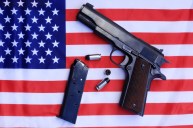A 34-year-old man pleaded guilty in federal court for his role in smuggling more than two million rounds of ammo into Mexico. According to last week's announcement, Erving Alberto Sauceda admitted to conspiring to launder money related to buying the ammunition.
Alamdar S. Hamdani, the U.S. attorney for the Southern District of Texas, called the conspiracy "astounding and historic" as his jurisdiction is "ground zero in the battle against Mexico's cartels and the illicit supply of firearms and ammunition to cartels."
In the announcement, Hamdani's office explained that Sauceda and others bought approximately $1,057,464 worth of ammo and magazines between August 2021 and the time he was arrested in April 2024 for drug cartels.
"This prosecution holds accountable the individuals and transnational criminal networks financing and smuggling firearms and ammunition into Mexico," Hamdani said.
The judge presiding over the case scheduled Sauceda's sentencing hearing for Sept. 12. For his crimes, he could face up to 20 years in prison and a $500,000 fine.
Sauceda and the ammo smuggling network
Details about the smuggling network are scarce because the court seals several documents and redacts parts of Sauceda's indictment. In an unsealed indictment, prosecutors named Sauceda along with nine others. However, four of the names were blacked out.
According to court documents, Sauceda and others bought ammo and mags from retailers in the Rio Grand Valley. Together, they bought 1.8 million rounds of 7.62x39m, 278,000 rounds of .223, 111,000 rounds of 5.56, 30,000 rounds of .308, 1,000 rounds of 9mm, and 504 AK rifle magazines.
Smuggling guns into Mexico
According to reports, federal agents are seizing more guns heading toward Mexico than the years before. The Trace, which covers gun violence, reported that U.S. Customs and Border Protection intercepted some 1,171 guns before they crossed into Mexico. However, experts say that's just a small number of the guns believed to be making into the country.
What's more, federal authorities argue that the increased number of trafficked guns and subsequent violence in Mexico correlate with an increase in drug deaths in the U.S.




